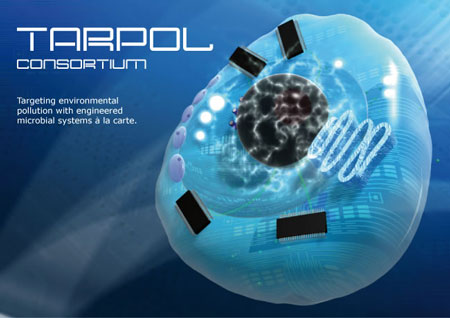| May 18, 2011 |
Laying the foundations for synthetic biology in Europe
|
|
(Nanowerk News) Over a two-year period, various European research groups have debated the future of synthetic biology in the TARPOL ("Targeting environmental pollution with engineered microbial Systems à la carte") project. An intense discussion on concepts and terminology has taken place and common databases have been created. The partners also launched an advanced training programme on synthetic biology and, after identifying the needs and priorities, developed an action plan for the European Union in this new field of science and technology.
|
|
Synthetic biology is an emerging research field which combines several scientific traditions around the goal of designing and manufacturing new biological systems of industrial interest. At present, the pace of genome sequencing is exponential and this is providing extremely valuable information and opens up the possibility of a better understanding of living systems and the design and manufacture of artificial forms of life.
|
 |
|
We only started to hear about synthetic biology ten years ago. However, in Europe there is enough critical mass in research and academic institutions, as well as an appropriate industrial environment, in order to allow us to compete with other countries in areas such as the use of synthetic biology to address environmental contamination issues. Using microorganisms to degrade very efficiently a toxic compound as an oil spill, for example is only one of its applications. The experts' work includes research in biofuels, hydrogen technology, and biomedicine where researchers have proved that it is possible to produce more efficient and cheaper drugs.
|
|
Eighteen research groups from eight European countries coordinated by the Cavanilles Institute of Biodiversity and Evolutionary Biology at the University of Valencia (Spain) have developed over two years the TARPOL project. Funded by the Seventh Framework Programme, this is one of the few European projects in synthetic biology and the most complete one. It has addressed more applied aspects such as the development of design and modelling tools, to a conceptual frame, without forgetting dissemination and ethical and social assessment.
|
|
"TARPOL has been a foundational project that has sought to join forces and unite all European groups involved in one way or another in synthetic biology to create synergies," says Spanish researcher Manuel Porcar. A very important part of the work involved developing databases and bioinformatics tools to work with the vast amount of data these experts handle. They have also reached a consensus on a common language, a crucial step in order to advance in any new discipline.
|
|
In the case of methodological issues, one of the most important has to do with the difficult transition between the mathematical modelling of a synthetic construction and its actual performance. Another key point is the explanation of evolution because, like any organism, the synthetic ones are also subject to evolution.
|
|
The researchers have reflected on the milestones and challenges that currently exist to create synthetic life. Among the obstacles to overcome, there is one that seems simple: to put the appropriate groups to work in common projects. However, this is not so easy because it requires experts in many different fields such as biologists, biotechnologists, mathematicians, physicists, and bioinformatics. Many of these researchers do not even know that they can work together in synthetic biology.
|
|
|
|
Another important point has to do with dissemination and training. Dr. Porcar said: "After the experience with GM foods, which has been a losing battle from the point of view of communication, the TARPOL partners decided to dedicate efforts in dissemination so as to offer the public a realistic picture and explain that synthetic biology is a useful technology." The consortium also organized two summer courses for students, one in Switzerland and one in Valencia, which brought together experts in synthetic biology from around the world, and they also supported a number of teams participating in the International Genetically Engineered Machine competition (iGEM). "Our intention is to support more young people to engage in a discipline that is also very young. In reality none of us working in this field is an expert, so innovative and enthusiastic views are encouraged."
|
|
On the other hand, partners have coordinated an extensive analysis on social and ethical issues that will be published shortly. This report approaches the environmental impact, as well as the possible consequences that can result in the development of different technologies. In this regard, they have considered both the negative reactions and the social and economic benefits of synthetic biology.
|
|
Although the project itself has ended, several articles are to be published with the main findings of the project and the partners will submit a full technical report to the European Commission with advice and predictions on the impact of synthetic biology in Europe. On the other hand, they will continue to develop the bioinformatics tools, online applications and databases and more applied projects will be launched.
|

